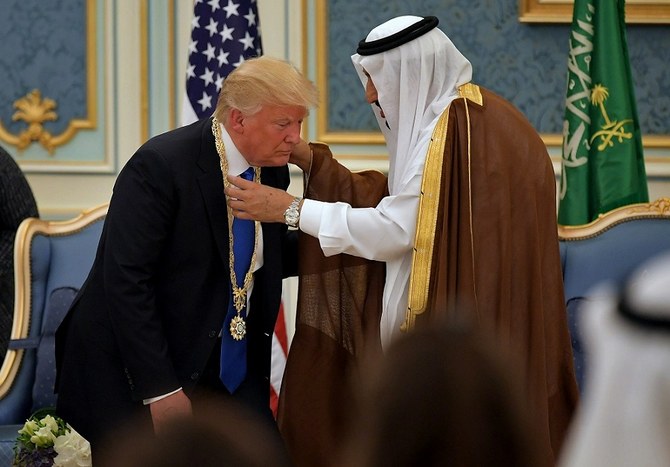
- ARAB NEWS
- 06 Jul 2025

Arab News publishes a story today, based on information from the Pentagon, which is a perfect example of US-Saudi cooperation for the greater good. Our US Special Correspondent Ray Hanania describes how American experts are training Saudi pilots to avoid civilian casualties in airstrikes. Pentagon sources have praised Saudi enthusiasm for the program, and the improvement in accuracy that has been achieved.
On a visit to Washington DC, I met a number of senior State Department and Pentagon officials who are working on confronting Iran and terrorism. From our discussions, it is safe to say that US decision makers who know the realities on the ground are not only appreciative of Saudi support for the US, but also sympathetic toward what the Kingdom must do to defend itself against the Houthis in Yemen. “I cannot but have full sympathy and understanding for anyone waging war against an Iranian-backed armed militia,” a US government official said.
Of course, no one wants to see civilians hurt, but there is no such thing as a “pretty” armed conflict; war is always ugly.
There have been mistakes in Yemen, and that is sad. One innocent life lost is one too many. But there is a crucial difference between the Saudi-led coalition and the Iran-backed Houthis. The former will do everything possible to avoid harming civilians, even if that means a delayed victory, an increase in skepticism and a longer campaign. The latter, on the contrary, will brag about firing missiles at commercial airports and population centers in Riyadh and elsewhere, with the deliberate aim of harming civilians.
Of course, not everyone in Washington gets this ... or indeed wants to. The other sad reality is that, between the war in Yemen and the awful murder last year of journalist Jamal Khashoggi, it has become easier to criticize Riyadh and question the value of the historic Saudi-US relationship.
“People with short-term memories criticize the Trump administration for blocking legislation that would prohibit selling arms to Saudi Arabia. They forget that President Obama, a Democrat, vetoed the Justice Against Sponsors of Terrorism Act, a profoundly misguided piece of legislation that specifically targeted Saudi Arabia.”
Faisal J. Abbas
This is particularly true as America warms up for the 2020 presidential election. With the collapse of the investigation into Donald Trump’s alleged collusion with Russia, the administration’s strong ties to Saudi Arabia have become the favorite new stick with which to beat the president. This was certainly the case during the first round of Democrat debates for the party’s presidential nomination. It is regrettable that some of these otherwise perfectly capable candidates have resorted to using Saudi Arabia as a political football.
This is not to say that the Yemen war cannot and should not be criticized; in that respect it is no different from any war. But when Saudi Arabia has made clear its determination to end the conflict as soon as possible, has made many attempts to reach a political settlement, and, last but not least, is footing a hefty military and humanitarian bill, it is fundamentally unfair for Riyadh to be portrayed as the villain.
As for Khashoggi, while critics would do well to wait for the outcome of the judicial process, it seems to me that some US politicians would like to punish the whole Saudi population for a crime committed by a few; refusing to sell Saudi Arabia weapons to defend itself would allow the Houthis to attack more airports and target more civilians.
However, there is more to the debate in the US than this; some are questioning the very need for a Saudi-US relationship, and it is important to counter their “arguments” with facts.
First, it is a myth that the Democratic Party is inherently anti-Saudi. People with short-term memories criticize the Trump administration for blocking legislation that would prohibit selling arms to Saudi Arabia.
They forget that President Obama, a Democrat, vetoed the Justice Against Sponsors of Terrorism Act, a profoundly misguided piece of legislation that specifically targeted Saudi Arabia. Obama, who famously bowed in respect to the late King Abdullah, knew and appreciated Saudi Arabia’s significant regional role.
Second, there are worrying concerns about the arguments advanced by some of the Democrat candidates. Saudi Arabia is not just another US strategic partner, it is a historic and crucial ally in a relationship bound by neither time nor circumstances.
Saudi Arabia will not suddenly cease to be the land of Islam’s two holy shrines, or stop producing oil. Any country that genuinely wants to succeed in the war against terror requires the religious support of Saudi Arabia, and Saudi political weight is essential for initiatives such as Jared Kushner plan for Palestine.
With Princess Reema bint Bandar as the Kingdom’s new — and first female — ambassador in Washington, Saudi Arabia literally has an “uphill” battle to explain these realities to Congress, politicians and journalists. I noticed during my visit that she is determined to meet Saudi friends and critics alike.
It will be difficult to win everyone over, but it is crucial that the facts are laid out and communication channels kept open. This is not just because there is genuine change in the Kingdom (dismantling all forms of male guardianship of women being the most recent example), but if Democrat candidates continue with an emotional and irrational approach to international relations and historic allies, they will harm not only Saudi interests, but US interests too.